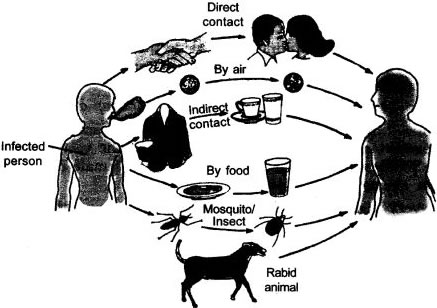Question: Write a short note on malaria as a disease, its symptoms and control.
Answer: Malaria is caused by protozoa that lives in blood. This parasite enters our body through a female Anopheles mosquito bite which is the vector, visits water to lay eggs, the protozoa enters our blood stream when female mosquito bites us. This protozoa affects our liver and red blood cells.
- Symptoms: Very high fever with periodic shivering, headache and muscular pain.
- Control: Use of quinine drug, keeping the surroundings clean with no stagnant water, use of mosquito repellent creams, nets, can control the spread of this disease.
Question: What is AIDS? How does a person get affected with HIV?
Answer: AIDS is Acquired Immuno Deficiency Syndrome, it is caused due to HIV— human immuno deficiency virus. This virus reduces the immunity of human body. Therefore if any microbe enters the body of a person it causes disease killing the person.
The virus is transmitted from infected person to other person by any of the following way:
- Blood transfusion.
- From mother (infected) to baby in the womb.
- From mother’s milk to lactating baby.
- By sexual contact.
- Sharing of needle with an infected person.
Question: Becoming exposed to or infected with an infectious microbe does not necessarily mean developing noticeable disease. Explain.
Answer: This is because the immune system of our body is normally fighting off microbes. Our body have cells that are specialised in killing infecting microbes. Whenever any microbes or foreign body enters our system, these cells become active and kill the microbes that could cause any damage to the body. These immune cells manage to kill off the infection and a person does not get disease.
Question: What are three limitations for the approach to deal with infectious diseases?
Answer: The three limitations are:
- If someone has a disease, their body functions are damaged and may never recover completely.
- As the treatment will take time, the person suffering from a disease is likely to be bedridden for some time.
- The infectious person can serve as the source from where the infection may spread to other people.
Question: Give the common methods of transmission of diseases.
Answer:
The common methods of transmission of diseases are:
- By air – cough, cold, tuberculosis
- By food and water – typhoid, jaundice
- By mosquito bite – malaria
- By rabid animal – rabies
- By direct contact – skin infection, small pox, AIDS
- By indirect contact – typhoid, chickenpox
Question: What are the basic conditions for good healths?
Answer: The basic conditions for good health are:
- Proper balanced and nutritious diet
- Personal hygiene
- Clean surroundings and clean environment
- Regular rest
- Proper rest
- Good economic status.
 Class Notes NCERT Solutions for CBSE Students
Class Notes NCERT Solutions for CBSE Students




